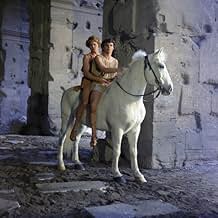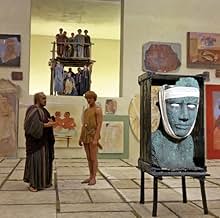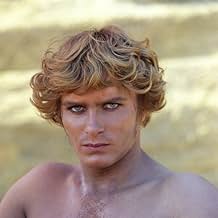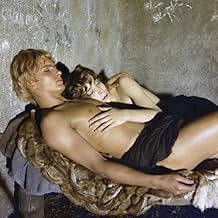Une série de contes mythiques situés au premier siècle à Rome.Une série de contes mythiques situés au premier siècle à Rome.Une série de contes mythiques situés au premier siècle à Rome.
- Réalisation
- Scénario
- Casting principal
- Nommé pour 1 Oscar
- 5 victoires et 8 nominations au total
- Trimalcione
- (as Il Moro)
- Scintilla
- (as Danica la Loggia)
- La matrona
- (as Lucia Bosé)
- Il suicida
- (as Joseph Weelher)
- Minotauro
- (as Luigi Montefiori)
Avis à la une
"Satyricon" feels empty, loud, and shallow. I rather read Petronius's book or watch the immortal, impressive, and full of character El Fayum portraits.
I prefer more " Fellini's Roma" as beautiful as "Satyricon", it is much more enjoyable, has a subtle message and a lot of heart and magnificent Eternal City is deservingly the only main character of Maestro Fellini's very personal film.
The film is freely adapted from Petronius' book, which is the exploits of two young Romans, Ascilto and Encolpio, as they venture throughout the empire, indulging in both heterosexual and homosexual relationships In the course of this proliferation of sensuality, Ascilto becomes impotent and madly goes for a cure which ends in tragedy for Encolpio
The movie's treatment of the sexual decadence is remarkably powerful without being explicit In fact, in light of the mental images it presents, it actually puts on view very little on screen But there is a great quantity of mysterious whores, hedonists, gluttons, and gross indulgence in carnal pleasure In the midst of this chaos, however, there is a beautifully light reprieve as the young Romans come across a forsaken villa... A very charming slave girl has remained behind, and she playfully troubles the two men into an erotic game
Apart from that, the sex is portrayed as bizarre, tempting, suggestive of hidden secrets, violating the rules of morality, and going beyond the limit
On one hand, its many flaws are rather upsetting. The out-of-sync lipping (bad post-sync), the fact that the movie neither really tells a story nor evocates sensible moral or philosophical concepts... so one may say it's actually a dull movie. The violence in this movie doesn't seem to make real sense, neither does the homosexuality, neither does the "romanian decadence" portrait.
On the other hand, the scenography, the sets, the costumes and makup are among the most dazzling ones you'll ever see in cinema, and the cinematography... well... maybe the BEST one you'll ever see. I can't think of any another movie able to compete with "Satyricon"'s mindblowing cinematography. Each scene is a terrific picture, with several visual layers, extraordinary lights and focuses, a lot of invention, of visual flair, and the overall technical mastery is stunning.
The result is something mesmerizing for some, totally disgusting for others. I have to say I'm more on the mesmerized side, because I was mainly focused on the visual/meditative aspects of the movie, not on the narrative ones.
If you're really into cinema, I mean as an artistic media more than as entertainment, you MUST see "Satyricon", as it's to my sense the most *visually* outstanding movie ever made. Be prepared for some disappointment about the movie as a whole, though...
Le saviez-vous
- AnecdotesGian Luigi Polidoro registered the title Les dégénérés (1969) for his movie first. Federico Fellini fought to use the title for his movie but lost the case. Subsequently the title was changed to Fellini Satyricon.
- GaffesIn one version, Joseph Wheeler is credited as 'Joseph Weelher'.
- Citations
Soldier at Tomb: They've stolen the hanged man! While I was with you, the thief's family took him away! I know what punishment I'll get... a horrible death. Why should I wait for it? I'd rather die by my own hands.
[pulls his sword out and is about to stab himself]
Wife of Ephesus: [stops him] No! No, my dear... To lose the two men in my life, one after the other, would be too much...
Wife of Ephesus: [looks at the corpse of her husband] Better to hang a dead husband than to lose a living lover.
[the couple replace the missing hanged corpse with the corpse of her husband]
- ConnexionsEdited into Fellini: Je suis un grand menteur (2002)
- Bandes originalesThe Drums for the Niegpadouda Dance
From Anthology of Music of Black Africa
Recorded by Everest Records
Arranged by Bernard C. Salomon
Published by Arvon Music
Meilleurs choix
- How long is Fellini's Satyricon?Alimenté par Alexa
Détails
Box-office
- Budget
- 3 000 000 $US (estimé)
- Montant brut aux États-Unis et au Canada
- 1 135 943 $US
- Montant brut mondial
- 1 138 108 $US
- Durée2 heures 9 minutes
- Mixage
- Rapport de forme
- 2.35 : 1
Contribuer à cette page



























